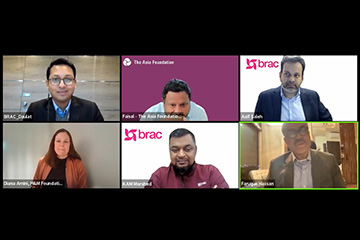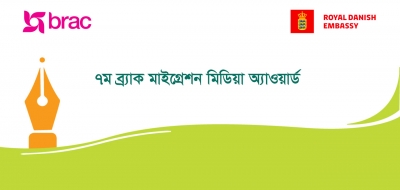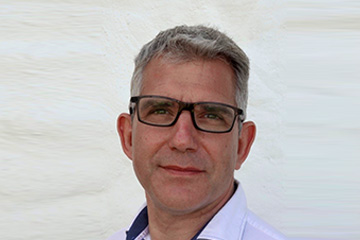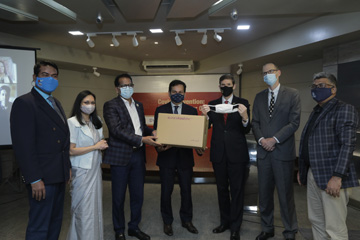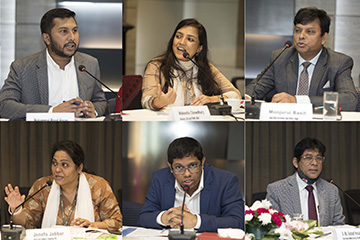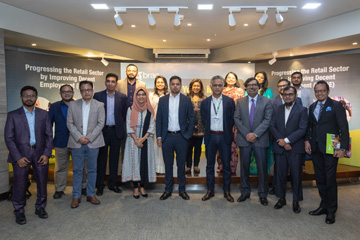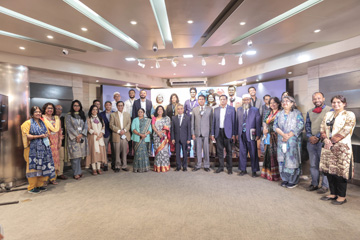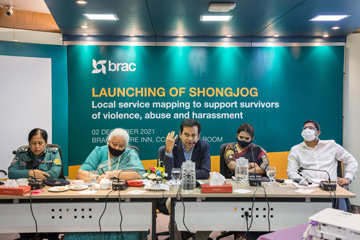
English (963)
Children categories
STITCH For RMG Global Innovation Challenge announces winners

Promoting innovations to transform the lives of women in RMG industry
BRAC, H&M Foundation, and The Asia Foundation have announced the six winners of the international competition titled “STITCH for RMG: Global Innovation Challenge”. The announcement was made last evening (Tuesday, 7 February 2022) at a virtual event organised by BRAC Social Innovation Lab, H&M Foundation, and The Asia Foundation.
The global competition was launched October last year (2021) to promote improved livelihood opportunities for the women working at the export-oriented readymade garment factories in Bangladesh, promote gender equality at the factory floors and increase factory performance.
The six winning teams of the competition are: Agroshift, iSmart, Jyoti, Quizrr, Sustify and ToguMogu. Faruque Hassan, president, BGMEA, Asif Saleh, executive director, BRAC, and Diana Amini, global manager, H&M Foundation, and Kazi Faisal Bin Seraj, country representative, The Asia Foundation, congratulated the winners.
Diana Amini, GM, H&M Foundation, said, ”I think we all have different roles to play, and for us, representing the philanthropic sector, our role is to be able to support early-stage ideas, methods, innovations, and also to be able to take risks that other actors cannot. And together with our partners, we can also co-create and validate solutions and invite others to play a part in helping us scale them.”
Asif Saleh, ED, BRAC, said, “Unlike how it is perceived elsewhere, we looked at innovation that is not necessarily driven by products, it can be about processes, it can be about simple solutions, and particularly, simplicity is the key toward scaling.”
Kazi Faisal Bin Seraj, CR, The Asia Foundation, said, “The thing that stood out for me in the pitches is that all the applicants used empathy to create their solution, that it is not just technology, rather how it is more appropriate in a context, in a gender sensitive manner. I think that empathy can be seen in all the programmes, in the global nature of it and the innovative nature of it”
Faruque Hassan, president, BGMEA, said, “We need more attention and investment in innovation, from businesses and state level, to upscale our capability and adaption. Global buyers are looking for sustainable manufacturing sources which resource efficient, without technology, optimum use of water, energy, and other resources cannot be ensured. So, we need to ensure 4th generation of technology in our supply chain.”
A member of team Quizrr said on behalf of the winners, “We look forward to new collaborations through this network. We want to learn from each other, so we can further accelerate our solutions and provide better innovations to this industry and its workforce.”
The awards for the winning teams come with grants up to USD 30,000 to pilot the solutions. The winners also will have opportunities for bootcamp training with mentors, incubators, and accelerators.
The solution focus of the winning teams are as follows.
- Agroshift is creating demand driven digital grocery platform for RMG workers;
- i-SMART is developing a standardized skill matrix for women sewing workers;
- Jyoti is removing the barriers of access to sanitary pads for RMG factory workers improving menstrual hygiene;
- Quizrr is building female RMG role models through skill and leadership development training;
- Sustify is building capacity through gamified microlearning for female factory workers in Bangladesh; and
- ToguMogu is supporting female RMG workers through a health and wellbeing platform making their parenthood stress-free.
The competition started with a “concept round” in which 220 applications were received and 50 applications were shortlisted for video submissions in the “pitching round”. A total of 12 teams won to move to the final round that organised a virtual marketplace, offering opportunities to partner with RMG factories. Through a tough competition the winning teams secured opportunities to incubate their projects in these factories that had volunteered to provide time, space, and other resources for the purpose.
The Marketplace Round was a unique opportunity for the competitors both from Bangladesh and beyond to discuss their ideas with factory owners and representatives, through which they were able to understand the probable demand and feasibility of their solutions on the ground. It was a matchmaking process where the factory owners jointly showed interest in developing the business together with the team they got matched with.
The competing ideas and solutions covered a range of themes from health, to skill development, security, sustainability and others. In total nine teams moved forward with factories based on the overall practicality of their solution. Of them, six teams topped the competition.
The “STITCH for RMG: Global Innovation Challenge” is part of the STITCH for RMG pilot project undertaken by BRAC, H&M Foundation and The Asia Foundation. The goal of the project is to create an environment that advances welfare and livelihood of the women in ready-made garments sector of Bangladesh as well as boost Bangladesh’s performance in the RMG industry.
BRAC, Embassy of Denmark sign MoU to implement rainwater harvesting project in Mongla
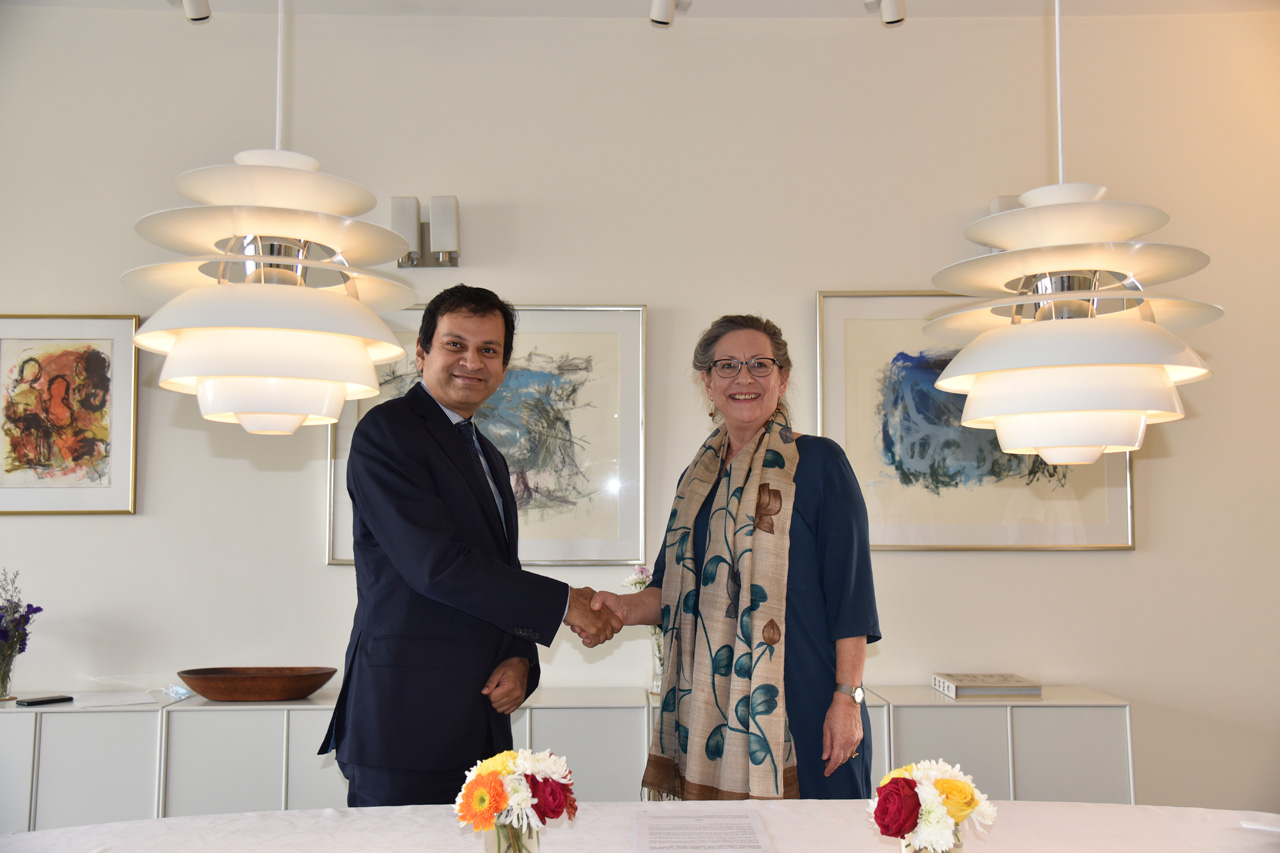
BRAC signed a memorandum of understanding with the Embassy of Denmark (EoD) in Bangladesh this morning (Thursday, 27 January) at the Danish ambassador's residence to implement a project titled ‘Enhancing Safe Drinking Water Security and Climate Resilience through Rainwater Harvesting’ in Mongla Upazila of Bagerhat District. The Danish embassy in Bangladesh will provide the total budget of the project at 29 million DKK over three years of project period to reach 67,300 climate vulnerable people with access to safe drinking water.
Mongla is one of the most climate-vulnerable areas in Bangladesh, particularly in terms of salinity intrusion. More than 60% of its inhabitants have no access to safe drinking water and are suffering from health and income loss. Women and girls are disproportionately affected due to the overburden of domestic work and social insecurity.
Winnie Estrup Petersen, ambassador of Denmark to Bangladesh, said at the signing ceremony, “We are very happy to take this step to deliver on the talks of COP 26. By 2023, Denmark will provide at least 500 million USD per year globally in grant-based climate finance. Bangladesh is amongst the world’s most climate vulnerable countries and should of course benefit from our strong climate commitment. This partnership signals first of several Danish commitments to climate adaptation and mitigation programmes for Bangladesh starting 2022.”
Highlighting the importance of adapting climate-adaptive measures for the people of the coastal belt of Bangladesh, Asif Saleh, executive director of BRAC said on the occasion, "No one should walk 2 km to fetch drinking water. However, climate change is driving an acute drinking water crisis in coastal Bangladesh. BRAC has been working persistently to ensure this basic human right of getting safe drinking water. We appreciate very much the support of the Embassy of Denmark in this endeavor. Together we will work towards developing a holistic and sustainable model of providing water at the last mile for every single Bangladeshi."
The project’s goal is to improve the wellbeing of the most climate-vulnerable population of the upazila by creating access to a nearby source of safe drinking water, a solution which can be replicated in other similar localities. In line with the Danish Development Strategy “The World We Share”, the project will enhance climate resilience following a community-centric locally-led approach, while coordinating with the government and other non-governmental actors.
৭ম ব্র্যাক মাইগ্রেশন মিডিয়া অ্যাওয়ার্ড
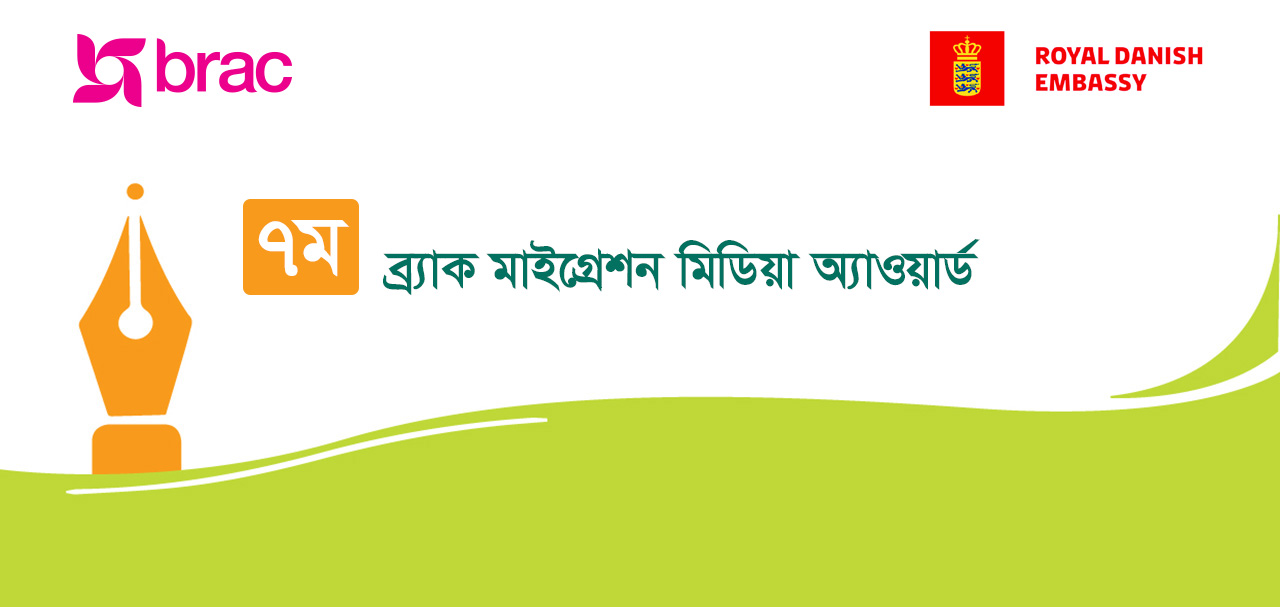
বাংলাদেশের উন্নয়ন এবং সমৃদ্ধির ক্ষেত্রে অভিবাসন খাতটি অত্যন্ত গুরুত্বপূর্ণ। জাতিসংঘের সর্বশেষ পরিসংখ্যান অনুযায়ী ২৭২ মিলিয়ন মানুষ (বিশ্ব জনসংখ্যার ৩.৫%) কাজের জন্য বা অন্য কোনো প্রয়োজনে নিজ দেশে বাস না করে অন্য দেশে বাস করছেন এবং উভয় দেশেরই আর্থ-সামাজিক উন্নয়নে গুরুত্বপূর্ণ অবদান রেখে চলেছেন। বৈশিক শ্রমঅভিবাসনে বাংলাদেশের অবস্থান ষষ্ঠ এবং প্রবাসী আয়ে অষ্টম।
কোভিড ১৯ মহামারীর কারণে বৈদেশিক কর্মসংস্থান কমেছে, বেড়েছে ফেরত আসা প্রবাসীর সংখ্যা। তবে রেমিটেন্স পাঠানোর ক্ষেত্রে বাংলাদেশ গড়েছে নতুন রেকর্ড। ২০১৯-২০২০ অর্থবছরে যেখানে দেশে মোট প্রবাসী আয় এসেছিল প্রায় ১৫৬ বিলিয়ন টাকা সেখানে ২০২০-২০২১ সালে এসেছে প্রায় ১৬৫ বিলিয়ন টাকা (তথ্যসূত্র: বাংলাদেশ ব্যাংক)।
বাংলাদেশকে আর্থিকভাবে সমৃদ্ধ করতে প্রবাসী আয় অত্যন্ত গুরুত্বপূর্ণ ভূমিকা পালন করলেও প্রয়োজনীয় তথ্যের অভাবে অভিবাসন প্রত্যাশীরা প্রায়শই প্রতারণার সম্মুখীন হচ্ছেন। বিশ্বের সর্ববৃহৎ বেসরকারি উন্নয়ন সংস্থা হিসেবে ব্র্যাক বাংলাদেশের অভিবাসনপ্রবণ জেলাগুলোতে নিরাপদ অভিবাসন নিশ্চিত, মানবপাচার প্রতিরোধ ও সচেতনতা সৃষ্টি এবং বিদেশফেরত অভিবাসীদের পুনরেকত্রীকরণের লক্ষ্যে কাজ করে যাচ্ছে। প্রতিবছর প্রবাস থেকে অনেক মানুষ দেশে ফেরত আসে। কিন্তু তাদের পুনরেকত্রীকরণের বিষয়টি একেবারে উপেক্ষিত থেকে যায়। বিষয়টির গুরুত্ব বিবেচনা করে ব্র্যাক ড্যানিশ দূতাবাসের সহায়তায় ‘সোশিও-ইকোনোমিক রিইন্টিগ্রেশন অব রিটার্নি মাইগ্রেন্ট ওয়ার্কার্স অব বাংলাদেশ- ফেইজ ২ (অনুপ্রেরণা)’ প্রকল্পটি বাস্তবায়ন করছে। এই প্রকল্পের অধীনে বিদেশফেরত অভিবাসীদের কাউন্সেলিং সেবা ও আর্থিক সহায়তাসহ বিভিন্নভাবে সহযোগিতা দেওয়া হচ্ছে।
দেশের উন্নতি ও সমৃদ্ধিতে গুরুত্বপূর্ণ অবদান রাখা অভিবাসী কর্মী ও তাদের পরিবারের অধিকার রক্ষায় গণমাধ্যমের ভূমিকা অনস্বীকার্য। অভিবাসনবিষয়ক সাংবাদিকতাকে আনুষ্ঠানিকভাবে স্বীকৃতি দিতে ব্র্যাক ২০১৫ সাল থেকে ‘ব্র্যাক মাইগ্রেশন মিডিয়া অ্যাওয়ার্ড’ প্রবর্তন করে। এরই ধারাবাহিকতায় অভিবাসন বিষয়ক সাংবাদিকতাকে অনুপ্রাণিত করতে সপ্তমবারের মতো ‘ব্র্যাক মাইগ্রেশন মিডিয়া অ্যাওয়ার্ড’ প্রদান করা হবে।
যেসব বিভাগে/ক্যাটাগরিতে ‘৭ম ব্র্যাক মাইগ্রেশন মিডিয়া অ্যাওয়ার্ড’ প্রদান করা হবে
(ক) সংবাদপত্র (জাতীয়): অভিবাসন বিষয়ে দেশে ও বিদেশে যে কোনো জাতীয় সংবাদপত্রে প্রকাশিত প্রতিবেদন।
(খ) সংবাদপত্র (আঞ্চলিক): অভিবাসন বিষয়ে বাংলাদেশের যে কোনো আঞ্চলিক সংবাদপত্রে প্রকাশিত প্রতিবেদন।
(গ) অনলাইন: অভিবাসন বিষয়ে দেশে ও বিদেশে যে কোনো অনলাইন পত্রিকায় প্রকাশিত প্রতিবেদন।
(ঘ) টেলিভিশন সংবাদ: অভিবাসন বিষয়ে দেশে ও বিদেশে যে কোনো টেলিভিশনে সম্প্রচারিত অনুসন্ধানী প্রতিবেদন।
(ঙ) টেলিভিশন অনুষ্ঠান: অভিবাসন বিষয়ে দেশে ও বিদেশে যে কোনো টেলিভিশনে সম্প্রচারিত অনুসন্ধানমূলক অনুষ্ঠান।
(চ) রেডিও: অভিবাসন বিষয়ে দেশে ও বিদেশে যে কোনো রেডিওতে সম্প্রচারিত অনুষ্ঠান/প্রতিবেদন।
(ছ) সোশ্যাল মিডিয়া: নিরাপদ অভিবাসন প্রতিষ্ঠায় ভূমিকা রাখা মানসম্মত ফেসবুক পেজ/ব্যক্তিগত আইডি/ব্লগ বা ইউটিউব চ্যানেল।
প্রতিবেদন/অনুষ্ঠান/সোশ্যাল মিডিয়া কনটেন্টসমূহ প্রকাশ বা প্রচারের সময়সীমা
দেশে অথবা প্রবাসে অবস্থানরত যেকোনো বাংলাদেশি সাংবাদিক ও গণমাধ্যম ব্যক্তিত্ব আবেদন করতে পারবেন। এছাড়া সোশ্যাল মিডিয়া ক্যাটাগরিতে যেকোনো বাংলাদেশি ব্যক্তি আবেদন করতে পারবেন। অভিবাসনবিষয়ক প্রতিবেদন/অনুষ্ঠান/সোশ্যাল মিডিয়া কনটেন্টসমুহ অবশ্যই ১ জানুয়ারি ২০২১ থেকে ৩১ ডিসেম্বর ২০২১ এর মধ্যে প্রকাশিত/প্রচারিত হতে হবে।
প্রতিবেদন জমা দেওয়ার নিয়ম:
সিরিজ রিপোর্ট ছাড়া কোনো প্রতিযোগী একই ক্যাটাগরিতে একের অধিক প্রতিবেদন জমা দিতে পারবেন না। সিরিজ রিপোর্টের ক্ষেত্রে পর্ব সংখ্যা এবং প্রকাশিত/প্রচারিত হওয়ার তারিখ উল্লেখপূর্বক সিরিজের সবগুলো প্রতিবেদন জমা দেওয়া যাবে।
যোগ্যতা ও সতর্কতা
মিডিয়া অ্যাওয়ার্ডের জন্য জমা দেওয়া প্রতিবেদন/অনুষ্ঠানসমূহের স্বত্বাধিকার নিশ্চিত করতে হবে। সংবাদপত্রে প্রকাশিত প্রতিবেদনসমূহের অনলাইন লিংক এবং টেলিভিশনে প্রচারিত প্রতিবেদন/অনুষ্ঠানের ইউটিউব লিংক (যদি থাকে) প্রতিবেদনের সঙ্গে জমা দিতে হবে। যদি অনলাইন লিংক বা ইউটিউব লিংক না থাকে সেক্ষেত্রে সংশ্লিষ্ট গণমাধ্যমের সম্পাদক/বার্তা সম্পাদক কর্তৃক নির্ধারিত সময়ের মধ্যে (১ জানুয়ারি ২০২১ থেকে ৩১ ডিসেম্বর, ২০২১) সংবাদ/অনুষ্ঠানটি প্রচারিত হয়েছে মর্মে (প্রকাশ/প্রচারের তারিখ উল্লেখসহ) সত্যায়নপত্র সংযুক্ত করতে হবে। সোশ্যাল মিডিয়ার ক্ষেত্রেও কন্টেন্টগুলো উল্লেখিত সময়ের মধ্যে প্রকাশিত/প্রচারিত হতে হবে। অসম্পূর্ণ/ভুল তথ্যসংবলিত আবেদন বাতিল বলে গণ্য হবে।
আবেদন করার শর্ত
১. অভিবাসন খাত, অভিবাসী ও শরণার্থী কিংবা তাদের পরিবারের অধিকার রক্ষায় গুরুত্বপূর্ণ ভূমিকা রাখে এমন প্রতিবেদন/অনুষ্ঠান/সোশ্যাল মিডিয়া কনটেন্ট (প্রকাশিত বা সম্প্রচারিত) হতে হবে।
২. সংবাদ প্রতিবেদন বা অনুষ্ঠানের ক্ষেত্রে দেশে বা প্রবাসে অবস্থানরত শুধু বাংলাদেশি সাংবাদিকরাই এই অ্যাওয়ার্ডের জন্য আবেদন করতে পারবেন।
৩. সোশ্যাল মিডিয়া কন্টেন্টের ক্ষেত্রে যে কোনো বাংলাদেশী ব্যক্তি আবেদন করতে পারবেন।
৪. আবেদনকারীকে অবশ্যই তাঁর জীবনবৃত্তান্ত যথাযথ ফরমেটের মাধ্যমে (ফরমেটগুলো সর্বশেষ পাতায় সংযুক্ত) পাঠাতে হবে। প্রয়োজনীয় নথি হিসেবে প্রতিবেদন যে মাধ্যমে প্রকাশিত হয়েছে তার বিবরণ জমা দিতে হবে।
৫. আবেদনকারী তাঁর কর্মজীবন সম্পর্কে অর্ধেক পাতার মধ্যে সংক্ষিপ্ত বিবরণ (বাংলা ও ইংরেজি ভাষায়) সংযুক্ত করে পাঠাবেন। সংযুক্ত ফরমেটটি পূরণ করে আবেদনপত্রের সঙ্গে পাঠাতে হবে।
৬. প্রিন্ট মিডিয়ার প্রতিবেদনের ক্ষেত্রে (জাতীয় ও স্থানীয় উভয় ক্ষেত্রে) সংবাদপত্রে প্রকাশিত মূল কপিটি প্রেরণ করতে হবে। সংবাদপত্রের এবং প্রতিবেদকের নাম ও তারিখ অবশ্যই দৃশ্যমান হতে হবে। সংযুক্তি হিসেবে প্রকাশিত কপি ছাড়াও সিডির মাধ্যমে সংবাদটির ওয়েব লিংক এবং সফটকপি জমা দিতে হবে।
৭. বেতারের ক্ষেত্রে এএম, এফএম এবং পডকাস্ট বেতারতরঙ্গে সম্প্রচারিত অনুষ্ঠান অথবা প্রতিবেদন হতে হবে। এর সঙ্গে সংক্ষিপ্ত/সম্পূর্ণ স্ক্রিপ্ট যদি বর্তমান থাকে তবে জমা দিতে হবে। নিয়মিত বেতারে সম্প্রচারিত অনুষ্ঠানের অন্তত পরপর তিনটি অনুষ্ঠানের কপি জমা দিতে হবে।
৮. টেলিভিশনের ক্ষেত্রে অবশ্যই সম্পূর্ণ স্ক্রিপ্ট সহকারে প্রতিবেদনটি সিডি/ডিভিডির মাধ্যমে জমা দিতে হবে।
৯. অনলাইন মিডিয়ার ক্ষেত্রে প্রতিবেদনটি ওয়েবসাইটে প্রকাশিত হতে হবে এবং অনলাইনে যেভাবে প্রচারিত হয়েছে সেভাবে সংশ্লিষ্ট প্রতিবেদনটি স্ক্রিনশটসহ জমা দিতে হবে। এছাড়াও ইউআরএলসহ সফটকপি সিডিতে জমা দিতে হবে।
১০. সোশ্যাল মিডিয়ার ক্ষেত্রে ফেসবুক পেজ/ ব্যক্তিগত আইডি অথবা ইউটিউব চ্যানেলে প্রকাশিত অভিবাসন বিষয়ক অন্তত দশটি কন্টেন্টের লিংক এবং সোশ্যাল মিডিয়ায় যেভাবে প্রকাশিত হয়েছে সেভাবে স্ক্রিনশট দিয়ে পাঠাতে হবে। (২০২১ সালের ৩১ ডিসেম্বরের পর কন্টেন্টের কোন ধরনের সম্পাদনা গ্রহনযোগ্য হবে না)।
বিচারকমন্ডলী
যেসব প্রতিষ্ঠান বা সংস্থার সম্মানিত বিচারকমন্ডলীর দ্বারা আবেদনকৃত প্রবন্ধ/অনুসন্ধানী প্রতিবেদন মূল্যায়ন করা হবে: ১. প্রবাসী কল্যাণ ও বৈদেশিক কর্মসংস্থান মন্ত্রণালয়ের একজন প্রতিনিধি।
২. গণযোগাযোগ ও সাংবাদিকতা বিভাগের একজন শিক্ষক।
৩. আন্তর্জাতিক সংস্থার একজন প্রতিনিধি।
৪. একজন সিনিয়র সাংবাদিক/গণমাধ্যম ব্যক্তিত্ব।
আবেদনের শেষ তারিখ
২০২২ সালের ২৮শে ফেব্রুয়ারি বিকেল ৫টার মধ্যে আবেদনটি ‘৭ম ব্র্যাক মাইগ্রেশন মিডিয়া অ্যাওয়ার্ড’ আয়োজক কমিটি ঠিকানায় পৌঁছাতে হবে। নির্ধারিত সময়সীমার পরে কোনো আবেদন গ্রহণযোগ্য হবে না। আবেদন সরাসরি বা ডাকযোগে জমা দিতে হবে। তবে প্রবাসে অবস্থানকারী সাংবাদিকেরা ইমেলেইলের মাধ্যমেও প্রতিবেদন জমা দিতে পারবেন।
আবেদন জমাদানের ঠিকানা:
‘৭ম ব্র্যাক মাইগ্রেশন মিডিয়া অ্যাওয়ার্ড’
মাইগ্রেশন প্রোগ্রাম, ব্র্যাক
ব্র্যাক সেন্টার, ৭৫ মহাখালী (১২ তলা)
ঢাকা-১২১২
বাংলাদেশ
ইমেইল: This email address is being protected from spambots. You need JavaScript enabled to view it.
প্রয়োজনে যোগাযোগ: ফোন: ৮৮০২ ২২২২৮১২৬৫ এক্সটেনশন: ৩৯১৩
পুরস্কার বিতরণী অনুষ্ঠান
‘৭ম ব্র্যাক মাইগ্রেশন মিডিয়া অ্যাওয়ার্ড’ এর পুরষ্কার বিতরণী অনুষ্ঠানের তারিখ সংশ্লিষ্টদের যথাসময়ে জানানো হবে।
BRAC Global welcomes Jerome Oberreit as its first Executive Director
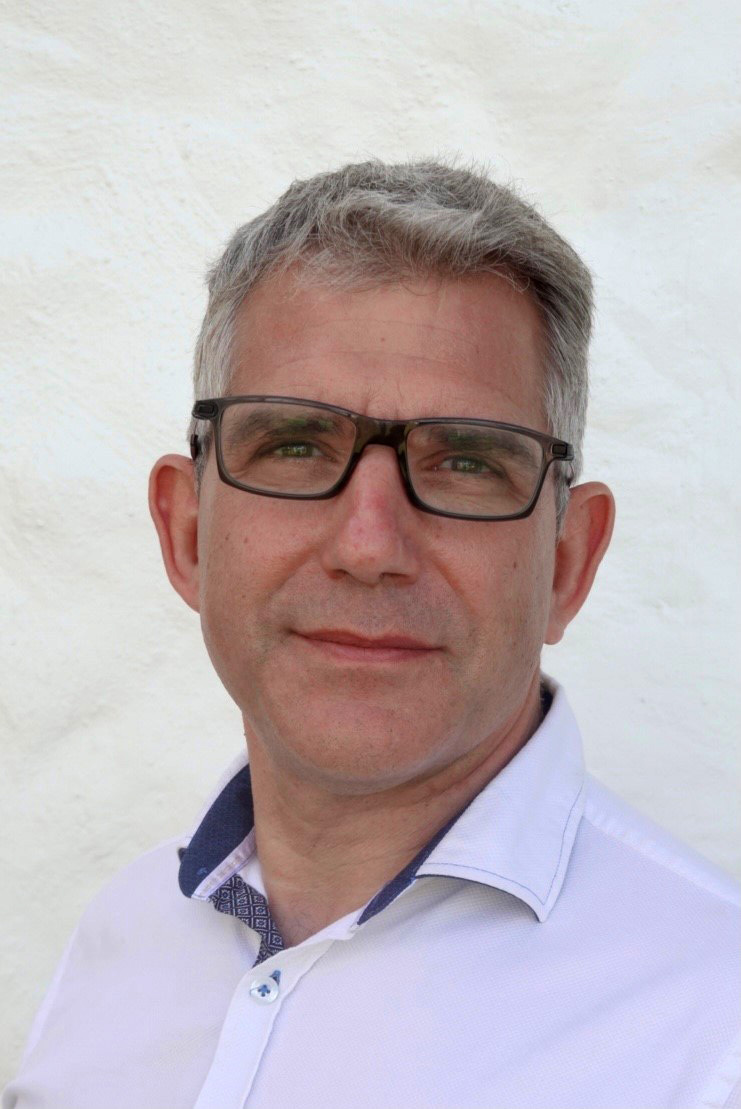 BRAC Global is pleased to announce that Jerome Oberreit has been appointed as its first Executive Director, effective 10 January 2022.
BRAC Global is pleased to announce that Jerome Oberreit has been appointed as its first Executive Director, effective 10 January 2022.
BRAC is an international development organisation founded in Bangladesh in 1972 that partners globally with over 100 million people living with inequality and poverty to create sustainable opportunities to realise their potential. BRAC Global was established in 2019 by BRAC’s founder, the late Sir Fazle Hasan Abed, to promote policy and programmatic lessons from BRAC among the global development community, and to provide coordination and coherence across all of BRAC’s entities. The OneBRAC family includes two operational entities – BRAC Bangladesh and BRAC International; and two fundraising entities – BRAC UK and BRAC USA. BRAC Global is distinct from BRAC International which implements BRAC’s development programs on the ground in all countries apart from Bangladesh.
As Executive Director of BRAC Global, Jerome will, together with the leaders of other BRAC entities, play a critical role in advancing BRAC’s global strategy, resource mobilisation and organisational development. Jerome will guide the development of key cross-cutting issues, including risk management and safeguarding, human resource, financial management, communications, monitoring and learning.
“The Board of BRAC Global is delighted that Jerome Oberreit brings to the OneBRAC family a range of relevant experience and skills from his distinguished career with Médecins Sans Frontières (MSF), and is confident that Jerome will provide the kind of facilitative leadership to the OneBRAC family that BRAC Global is committed to,” said Marty Chen, Chair of the BRAC Global Board.
“As BRAC turns 50, its achievements as a truly person-centric organisation are humbling. I am both honoured and excited to be the Executive Director of BRAC Global. We remain in a world of great uncertainly as the pandemic, climate change, global inequalities, and the continued unprecedented displacement remind us. These uncertainties reinforce the need for all of us, individually and collectively, to be socially enterprising. With a deep understanding of poverty reduction, BRAC has shown, through a supportive and inclusive approach with each individual, community and national partnership, how empowerment can create the necessary opportunities to turn lives around in the most challenging environments. BRAC is critical to reducing poverty and paving the road to social justice in our fast-changing world. I very much look forward to being part of this incredible journey,” said Jerome.
From 2012 to 2018, Jerome was the Secretary General of Médecins Sans Frontières International having been the Director of programmes from 2006 to 2012. He was instrumental in coordinating complex organisational systems in a multi-centric organisation focused on providing health services to the most neglected in resource-limited environments. In this role he led global positioning efforts and defined strategies and systems for securing resources (financial, human, and technical), ensuring both internal and external accountability. He also has country-level experience with MSF in several African countries and in the Middle East.
From 2019 to 2021, Jerome took part in the development of the Global Antibiotic Research and Development Partnership (GARDP), a new initiative launched by the World Health Organisation and Drugs for Neglected Disease Initiative, where he held the position of Senior Advisor to the Executive Director.
Jerome is fluent in French and English, holds a master’s in geography, and a bachelor’s in politics and geography.
BRAC receives 56 million cloth masks From US multinational Hanesbrands
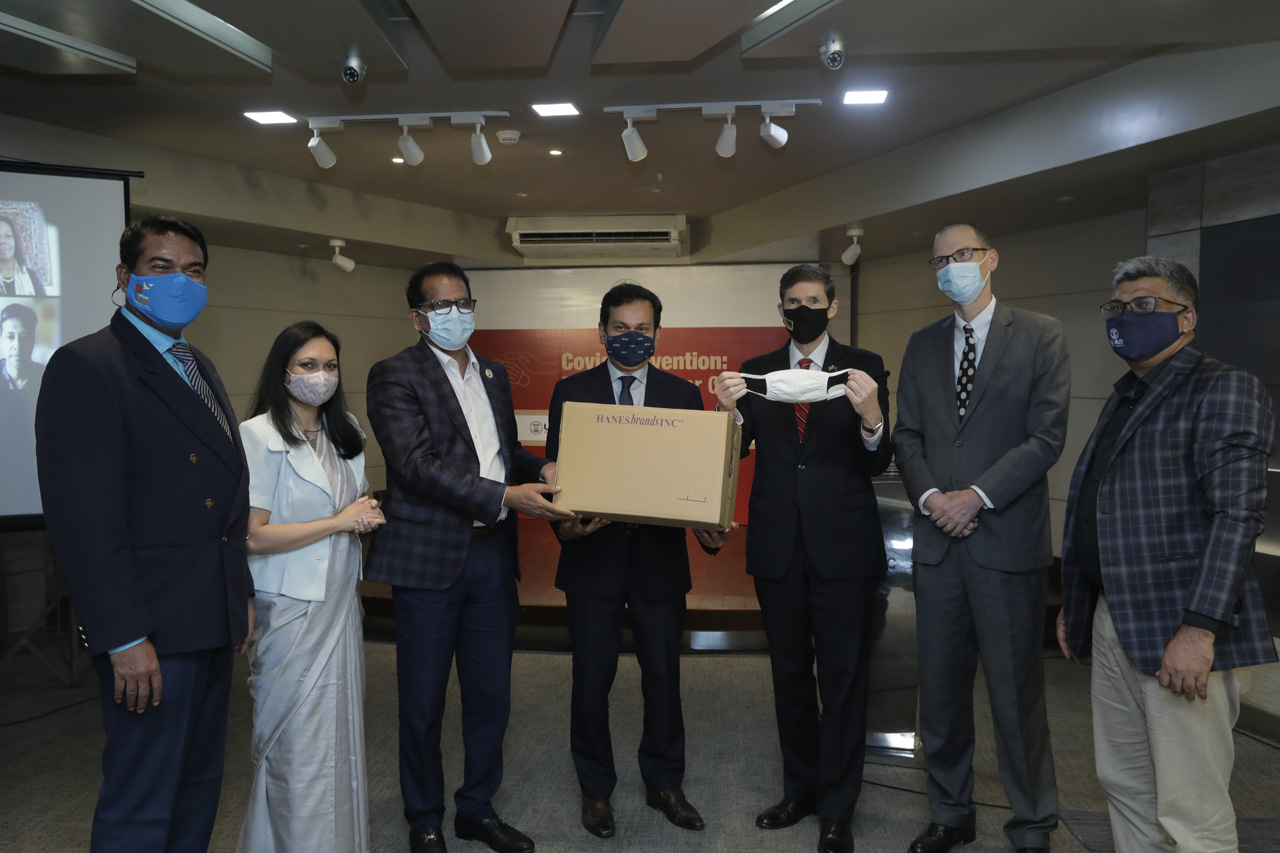
Distribution will be made among most vulnerable communities across country
As Bangladesh braces for a probable new wave of Covid-19, exacerbated by the Omicron variant, BRAC has received a bulk of 56 million three layered reusable cotton masks from Hanesbrands Inc., a US multinational corporation. The masks will be distributed among the most vulnerable people in all the 64 districts through community clinics.
Earl R Miller, US Ambassador to Bangladesh, formally handed over the masks to Asif Saleh, executive director of BRAC, at a ceremony at the BRAC Centre in the capital this evening (Thursday 06 January).
Lokman Hossain Miah, senior secretary to the Health Services Division, Ministry of Health and Family Welfare, attended the event as the chief guest with KM Tariqul Islam, director general, NGO Affairs Bureau, and Earl R Miller, US Ambassador to Bangladesh, being present as special guests.
US-based funding organisation the Open Society Foundation (OSF) and Yale University jointly coordinated the initiative to deliver the masks to BRAC.
Senior secretary Lokman Hossain Miah congratulated BRAC, Hanesbrands and other entities involved in this “great” initiative, and said, “There are two major ways to tackle transmission of Covid-19 at present. One is to ensure the wearing of masks by people including rickshaw-pullers, street vendors and day labourers who are constantly on the move for their livelihoods, and the other is vaccination. So it’s imperative that we make facemasks easily available to these people.”
US ambassador Earl R Miller at the ceremony said, “BRAC, the Government of Bangladesh, the American private sector and the US Embassy are working together to provide over 56 million masks to the Bangladeshi people donated by Hanesbrand, the American clothing company based in North Carolina. By heeding the lessons of science and history and through collaborative efforts like these, together, as a global community, we will defeat this pandemic.”
NGO Affairs Bureau director general KM Tariqul Islam said, “This bulk of masks will greatly help our vulnerable communities continue their fight against the pandemic. BRAC will distribute these masks across the country through the government’s community clinics network.
The BRAC executive director thanked the US government, Hanesbrands, Open Society Foundation (OSF) and Yale University for mobilising the donation and said, “Making masks available and accessible for all is crucial in the fight against Covid-19. We have seen significant success in mass vaccination in high-risk areas in Bangladesh, but additional preventive measures such as wearing masks are still vital. This donation will allow us to scale up our preventative efforts, and ensure that we can get free masks to the people who need them the most. We are extremely grateful to have support from multiple partners, which in addition to providing resources, provides us with encouragement that we are not in this fight alone.”
Strengthening the public prosecution system to ensure justice for sexual and gender-based violence

On 8 December 2021, BRAC's gender justice and diversity programme, with the support of BRAC’s social empowerment and legal protection (SELP), organised a roundtable discussion on ‘Strengthening the public prosecution system to ensure justice for sexual and gender-based violence’ in solidarity with the 16 Days of Activism 2021.
The discussion focused on identifying the best practices and potential solutions which can overcome key weaknesses in the public prosecution system in order to ensure justice in cases of violence against women and girls. Therefore it brought together key actors from all stages of the public prosecution system, such as police officers, forensic doctors, public prosecutors, legal aid lawyers, judges, along with government and non-government service providers, development partners and activists.

The discussants at the event included: Md Golam Kibria, Director (Training), Judicial Administration and Training Institute (JATI); Anna Minj, Director, Integrated Development Programme; Advisor, SELP and Protection Cluster, HCMP, BRAC; Jenefa Jabbar, Advocate, Supreme Court of Bangladesh; Director, Social Compliance and Safeguarding, BRAC; Nobonita Chowdhury, Director, Gender Justice and Diversity, and Preventing Violence Against Women Initiative, BRAC; Dr Md Shahadat Hossain Mahmud, Director General (Additional Secretary), Health Economics Unit, Ministry of Health and Family Welfare; Md Habibur Rahman Chowdhury, Deputy Director (Finance), Joint District and Sessions Judge, National Legal Aid Services Organization, Law and Justice Division, Ministry of Law, Justice and Parliamentary Affairs; Mohammad Tabarak Ullah, Additional Deputy Inspector General (DIG) of Police, National Emergency Service, Bangladesh Police; Ali Asgor Swapon, Special Public Prosecutor, Nari O Shishu Nirjaton Domon Tribunal Tribunal, Dhaka; Reena Debnath, Special Public Prosecutor, Nari O Shishu Nirjaton Domon Tribunal Tribunal, Narsingdi; and Dr Sohel Mahmud, Head, Department of Forensic Medicine, Sir Salimullah Medical College. Family members of a rape survivor and acid violence survivor also spoke at the event, highlighting the challenges and hurdles they faced when seeking justice.

The discussants highlighted the necessity of a number of reforms, including the need to: introduce a victim and witness protection system, incorporate virtual court system in Nari O Shishu Nirjaton Domon Tribunals, ensure gender sensitisation training for justice sector actors (such as judges and public prosecutors) and introduce a compensation scheme for survivors. The discussants also stressed the need to increase budgetary allocation for the public prosecution system and support services for survivors, such as by appointing more judges and prosecutors and establishing One Stop Crisis Centres and shelter homes in every district. All discussants acknowledged the necessity of jointly working together towards strengthening the public prosecution system to ensure justice for survivors of sexual and gender-based violence.
Opportunities to enhance youth employment in retail sector
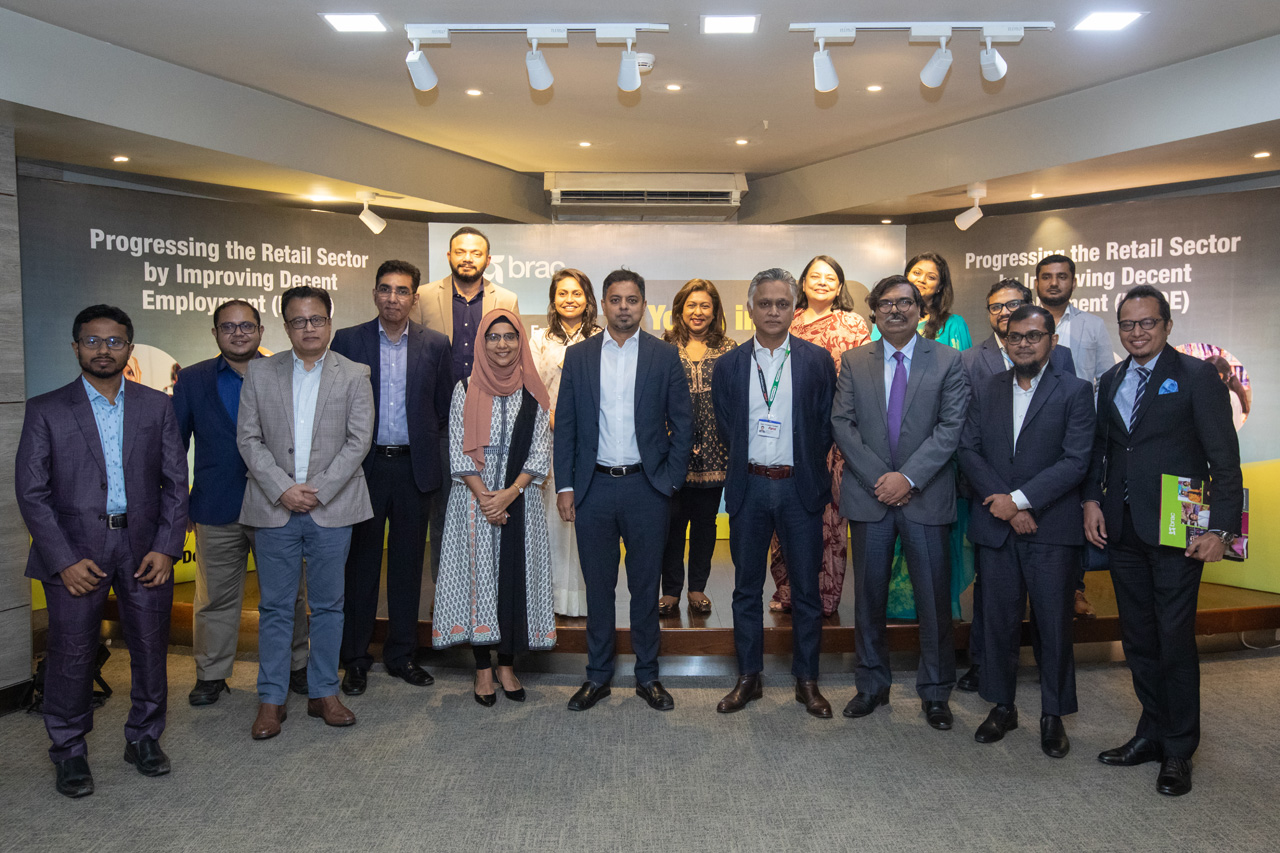
The retail sector of Bangladesh has already employed over six million (60 lakh) people. The sector has much growth potentials and will create employment opportunities for many more youths particularly women from the disadvantaged sections of the society in the coming years. Speakers came up with the observation while addressing a roundtable discussion on “Enhancing employment: Opportunities for youth in Bangladesh’s retail sector” organised in Dhaka today on Thursday.
The event, organised by BRAC’s Skills Development Programme (SDP) at the BRAC Centre this morning, aims to foster discussions with the private sector on youth employment in retail sales and skills training required for the jobs and advocate women and persons with disabilities inclusion in the retail industry.
Nihad Kabir, president, Metropolitan Chamber of Commerce and Industry (MCCI) was present as the chief guest at the event. Speakers at the roundtable, among others, were Tamara Abed, managing director of Aarong, BRAC, Syed Nasim Manzur, MD of Apex Footwear Ltd, Murtoza Zaman, chief executive officer of Unimart, Tanvir Sohel Khan, business director of Shwapno, Shaheen Khan, chief executive officer of Gemcon Food and Agricultural Products Ltd, Nure Alam Shimu, Managing Director of Gadget and Gear, M.M. Ferdous, Executive Director of Best Electronics, Mosaraf Hossain, Chief Operating Officer of Mirror Outfitters, Rubaiyath Sarwar, Managing Director of Innovision Consulting Ltd, Aziza Ahmed, head of operations of Bangladesh Business and Disability Network, Masudul Haq, MD of Amanah Group, Maria Huq, director of BRAC, Tasmiah Tabassum Rahman, Current in-charge, BRAC Skills Development Programme, and Joydeep Sinha Roy, Head of Operations, BRAC Skills Development Programme.
Considering the prospect of job creation in this sector, BRAC’s SDP is implementing a project titled “Progressing the retail sector by improving decent employment (PRIDE)”. The project aims to create a model for scale, providing sustainable livelihoods for low-income urban youths in Bangladesh in partnership with the retail sector and the Government of Bangladesh.
The retail sales project, funded by IKEA Foundation and UBS Optimus Foundation, aims to impact changes in the retail sector by providing decent work opportunities for disadvantaged urban youth, particularly women and persons with disabilities. It also supports industry standardisation in major cities like Dhaka, Khulna, Chattogram and Sylhet.
MCCI president Nihad Kabir in his chief guest’s speech said, “Women essentially need training to enter jobs in the retail sector. But at the moment training facilities for the aspirants are very limited. The government should focus on establishing these facilities.”
MD of Aarong Tamara Abed said, “It lies with us the employers to create decent work environment for both men and women at the workplace. There should be a continuous effort to make workplace environment more comfortable and healthy. There should also be sexual harassment prevention policies at place. Businesses should have separate washrooms and shift-based work schedule not only for women staff, but for the persons with disabilities also.”
Apex Footwear MD Syed Nasim Manzur observed, “It’s not only sufficient to organise training and employment in the retail sector, but quality improvement of the sector is also imperative. The government needs to play a decisive role in formulating necessary laws and giving recognition.”
Gemcon Food CEO Shaheen Khan said, “It’s a highly conventional idea that women cannot work as hard men. The women retailers in Bangladesh have proved their ability. We want more women in retailing. We have policy of inclusion in our business.”
Though the retail industry contributes significantly to Bangladesh’s Gross Domestic Product (GDP), opportunities for formal training hardly exists in the country for those looking for jobs in this sector. A baseline survey conducted in 2020 showed that a very low percentage of retailers provide formal training for their employees.
BRAC SDP, in collaboration with Bangladesh Technical Education Board has developed the country’s first accredited retail sales training module. Following this module SDP is currently providing training to those participating in its own training courses. Since the training began 54% of its participants are currently employed despite having no prior experience and the Covid-19 situation.
The retail industry in Bangladesh is male dominated with only 8% females. Retailers are reluctant to hire female staff citing safety issues and due to a pervasive perception that women cannot take physical strain. In the baseline survey, more than 50% of the respondent persons with disabilities stated they were not provided with specialised orientation although they had no previous work experience.
Retailers who did not hire persons with disabilities stated a number of reasons, the major ones among them are - the nature of business was not suitable, lack of accommodation at the workplace, and no applications received from aspirant persons with disabilities.
Tackling impact of Covid-19 on girls and young women Skills training in informal sector stressed
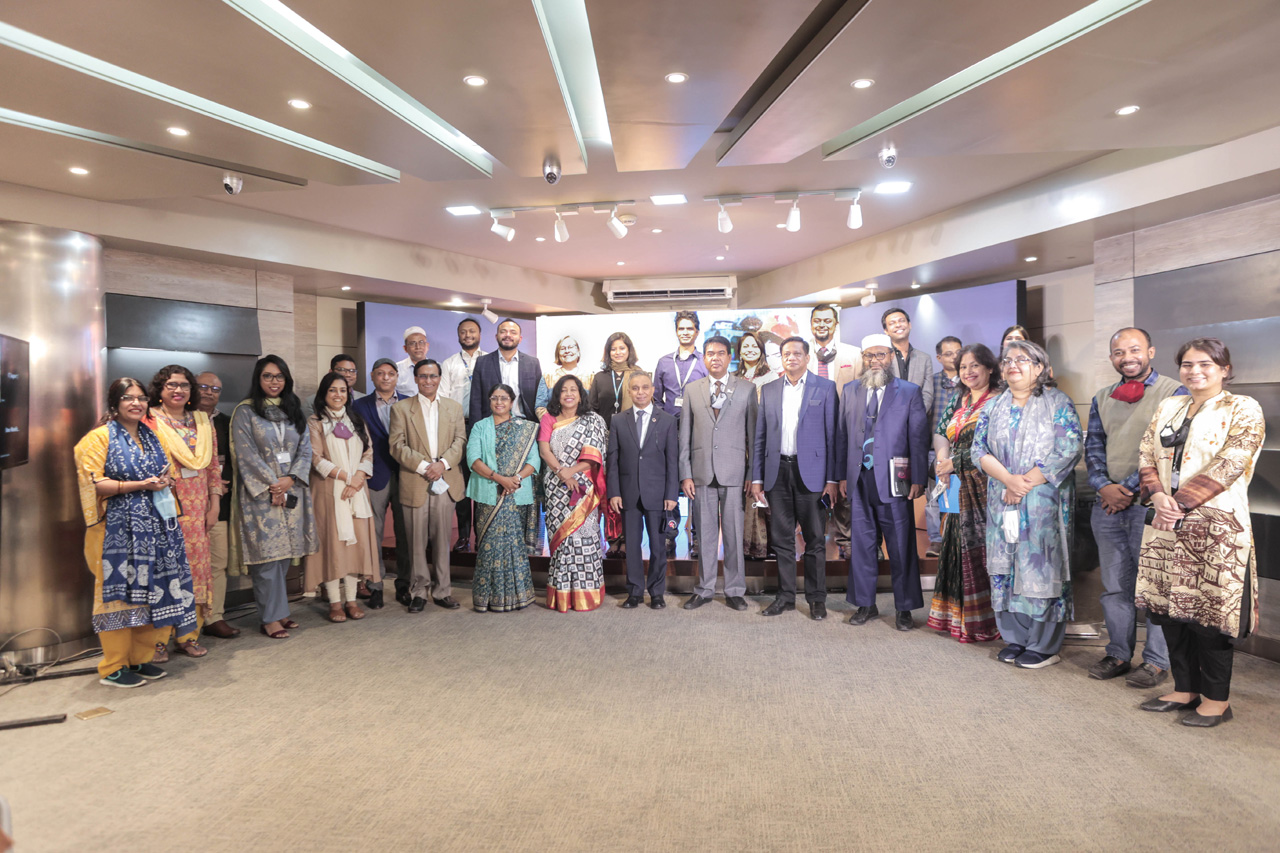
More than 50 million (5 crore) people involved in the country’s informal sector have borne the brunt of the Covid-19 pandemic. Women and adolescent girls engaged in this sector still suffered the worst of all. Participation in the labour market through effective skills training should be a high priority to assist them in recovering the situation. Speakers expressed these views at a discussion organised by BRAC’s Skills Development Programme (SDP) today on Thursday (2 December) at the BRAC Centre at Mohakhali in the capital.
K M Tarikul Islam, director-general, NGO Affairs Bureau, attended the event titled “Tackling Covid-19 adversities on girls and young women through skills training in the informal sector” as chief guest. Md Abul Kalam Azad, former principal coordinator (SDG affairs) at the Prime Minister’s Office was present as the special guest.
AFM Shahidur Rahman, director, Programme Development-Asia, PRL and Monitoring Department, BRAC, delivered the welcome speech, followed by a keynote presentation by Nobonita Chowdhury, director, Gender Justice & Diversity and Preventing Violence Against Women Initiative, BRAC, on the current state of girls and young women in the informal sector. Tasmiah Tabassum Rahman, in-charge, Skills Development Programme, BRAC, and Dr Narayan Chandra Das, senior research fellow, BRAC Institute of Governance and Development (BIGD), gave another presentation on “Skills interventions for mitigating risks on girls and young women - skills training for advancing resources (star), an apprenticeship-based skills training model”.
Veera Mendonca, deputy representative, UNICEF Bangladesh, Shahriar Islam, senior programme manager, Australian Department of Foreign Affairs and Trade, and Mirza Nurul Ghani Shovon honoured as Commercially Important Person status by the government, chairman, Informal Sector Industry Skills Council, spoke as panel speakers.
The speakers observed that the informal sector has been the worst affected in terms of the country’s labour market. The situation has its direct impact on the people involved in the sector, risking the livelihood of 52 million (5 crore 20 lakh) people. Women are the worst sufferer as nearly 91.8 per cent of total women labour force are engaged in informal economy.
A research carried out by BRAC last year (2020) revealed that regular earning dropped by 66 per cent for women involved in the informal sector, while their opportunities for work reduced by 24 per cent. Apart from these, the risk of dropping out of school has seen an alarming rise due to a prolonged shutdown of educational institutions and economic crisis, which has its inevitable adverse impact on other social situations.
Another study reveals that child marriage saw a staggering rise by 220 per cent between July and September last year. Experts mostly put down the causes to staying out of school and earning.
To recover from the crisis, BRAC puts particular emphasis on the re-engagement of women in the labour market and has accordingly designed its programmes and activities to fulfil that aim.
NGO Affairs Bureau director-general KM Tarikul Islam said, “All the organisations are working to fulfil the aim to have 10 million (1 crore) people employed in the Mujib Borsho (Birth Centenary of Mujib). The government has created a number of industries which will provide employment to women as well. But it’s a big challenge to tackle which the non-state development actors should come forward to assist the government.”
Former principal coordinator for SDG affairs at the PMO Md Abul Kalam Azad said, “In Bangladesh over 18 million (1.8 crore) women are employed in the labour market. We must also think what crisis these women may face in their livelihoods in case the Omicron variant of Corona virus spread in Bangladesh. We have to be adequately prepared to tackle the situation.”
In his closing remarks BRAC’s senior director KAM Morshed said, “It is a time when skills development should be a planned option. Many young people can choose skills development education instead of pursuing the path of conventional education.”
BRAC launches information website to support survivors of violence
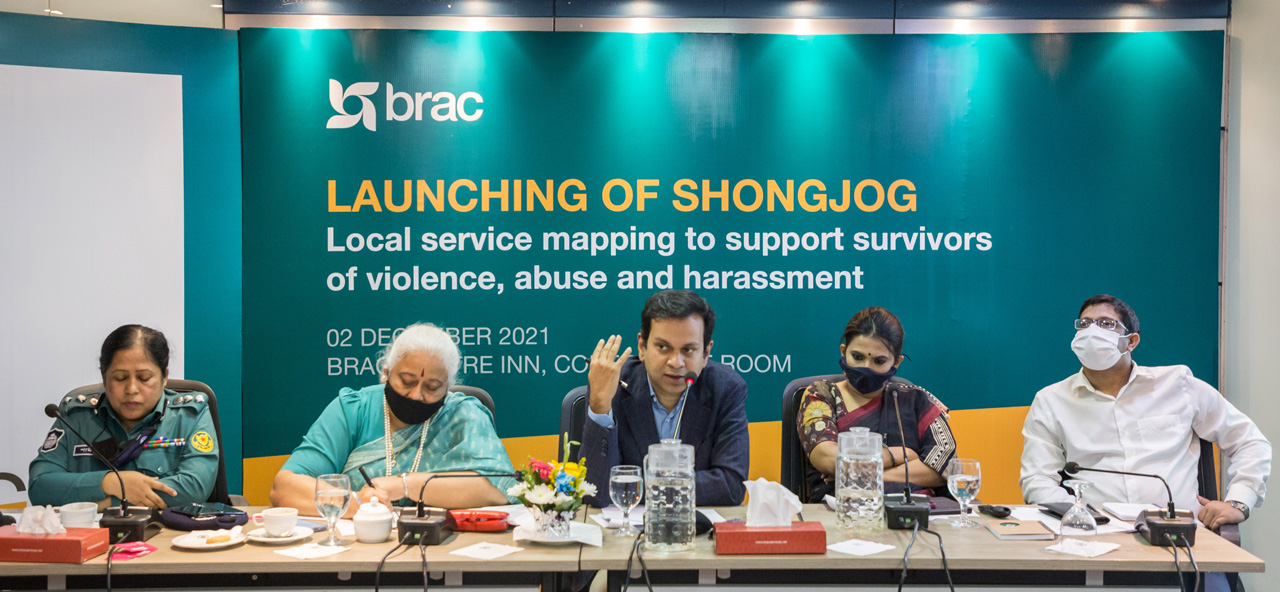
The local service mapping website titled “Shongjog” will offer information on medical, legal, psychosocial and other relevant local services.
BRAC has launched a specially designed database on a user-friendly local service mapping website called “Shongjog” to support survivors of violence to access eight types of necessary information and avail services from state and non-state actors.
The interactive tool that offers name, contact details and other information on service providing agencies was introduced for the public at an event held at the BRAC Centre on Thursday morning, 2 December 2021.
BRAC will offer information on eight types of services from this platform that has been developed based on a mapping conducted in 61 districts covering 435 upazilas across Bangladesh.
Aroma Dutta, member of parliament, and Md Habibur Rahman Chowdhury, deputy director, National Legal Aid Service Organisation (NLASO), attended the event as the chief guest and special guest respectively. Asif Saleh, executive director, and Jenefa Jabbar, director, Social Compliance and Safeguarding, BRAC, also spoke at the event.
The services in the mapping mainly include medical/health services, legal services, psychosocial services, safe/shelter homes, police stations and other necessary local service information for the survivors of violence. Through this website any victims/survivors of abuse, harassment and violence will be able to gain access to information and services designed to assist them to recover from traumatic experiences. It will result in an increased access to the system of government and non-governmental services, expected the organisers.
Appreciating this initiative, lawmaker Aroma Dutta called on all the civil society entities working on women’s rights to join the effort. She suggested BRAC should use the information on this website to develop a data bank to ensure more efficient support for survivors of violence.
NLASO deputy director Md Habibur Rahman Chowdhury assured that initiative will be taken to add details of all the government legal aid offices in different districts to this website. He emphasised the need to bring all the organisations working with survivors of violence under a single umbrella for success of this initiative.
BRAC executive director Asif Saleh said “This initiative will be truly successful only when people will get updated information from this site. But it’s not possible for BRAC only to entirely update it. It needs collaboration from all relevant stakeholders.” He urged all to not consider the website as an initiative solely of BRAC and to make their own contributions so that it becomes successful.
Jenefa Jabbar, director, Social Compliance and Safeguarding, BRAC, said her organisation will collaborate with the government and non-state actors at both the central and local levels to create a wider range of connectivity and referral linkage.
Taslima Yesmin, associate professor, Department. of Law at the University of Dhaka, and representatives from different organisations also attended the event. From BRAC, Tahmina Yesmin, safeguarding lead, Kollol Nag, Head of Platform under Technology Division, Taqbir Huda, advocacy lead for Communications and PVAW at Gender Justice and Diversity Programme, and Shashwatee Biplob, programme head, Social Empowerment and Legal Protection (SELP), were present, among others at the programme.
Change in social psyche must for disability inclusion
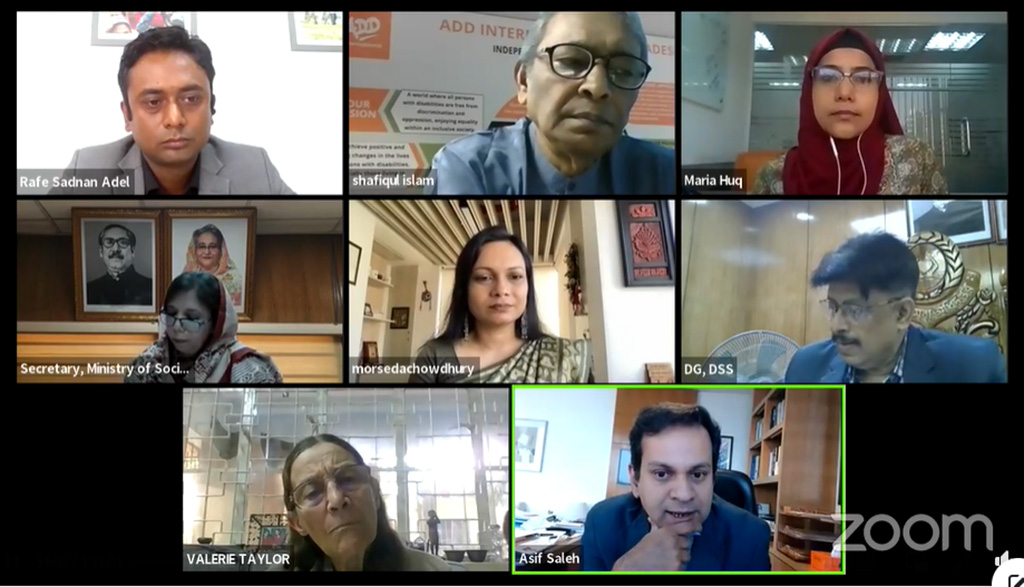
Ensuring rights and inclusion of the persons with disabilities is a formidable challenge towards achieving sustainable development. Tackling the challenge summons essential change in the pervasive negative social attitude and collaborative efforts from all including the government and non-governmental entities. Speakers expressed these views at a webinar organised by BRAC today on Tuesday.
The event was organised on the occasion of International Day of Persons with Disabilities (IDPD) to be observed on 3 December. Mahfuza Akhtar, secretary, Ministry of Social Welfare, attended the webinar as chief guest with Sheikh Rafiqul Islam, director general, Department of Social Services, attending as special guest. Asif Saleh, executive director, BRAC, Shafiqul Islam, country director, ADD International, Valerie Taylor, founder, CRP, Dr Morseda Chowdhury, and Maria Huq, directors, BRAC, spoke as panel speakers at the webinar. Rafe Sadnan Adel, head, Media and External Relations, BRAC, moderated the discussion.
The organisers said one-tenth of the country’s total population are persons with different kind of physical and mental disabilities. The overwhelming majority of these people are absent from the mainstream development scenario of the country, mainly owing to different inclusion related issues. Formulation and effective execution of disability-friendly policies are essential to promote inclusion of persons with disabilities in the mainstream development activities and build a sustainable future for them. All have to come together to make it possible.
Asif Saleh, executive director, BRAC, said, “Ideas such as persons with disabilities are people with very limited capacities, or they should not be given higher responsibilities, are very common in our society. We must break these ideas through exemplary development initiatives for persons with disabilities.” There is a lot of scope to work in this area, ensuring the equal rights of the persons with disabilities as the disadvantaged group of our society, he added.
The government is firmly committed to ensure the rights of and opportunities for the persons with disabilities, said Mahfuza Akhtar, secretary, Ministry of Social Welfare. The persons with disabilities need to be motivated about their potentials to become successful and at the same time the society has to change its conventional mindset. Although the government has promulgated laws and rules to safeguard their rights and formed committees in the districts and upazilas, it is, however, not possible for the government to do all that is needed. Collaborative initiatives from the government and the private sectors are essential to bring effective changes, the secretary observed.
Sheikh Rafiqul Islam, director general, Department of Social Services, called on the entrepreneurs, industrialists and private sector employers to provide jobs to the persons with disabilities, besides taking initiatives to create opportunities for them as well as undertaking rehabilitation and skills development initiatives.
ADD International country director Shafiqul Islam said, “The laws of Bangladesh safeguard the right of the persons with disabilities to access employment and safeguard them against discriminatory practices. The government is legally and politically committed to the cause, but it is not possible for the government alone to implement those rights. It needs coordinated and active participation from the persons with disabilities and the organisations that work with them.”
Having highlighted the exemplary successes of persons with disabilities in their jobs, CRP founder Valerie Taylor viewed that changes are happening now. “But the changes need to be speedier and it would be great if we all can be stakeholders to bring the change.”
BRAC Human Resource Division director Maria Huq mentioned a range of measures undertaken by BRAC to establish a disability-friendly workplace, and said the organisation has set a target to appoint 900 persons with disabilities as its staff by 2025.
BRAC Health, Nutrition and Population Programme director Dr Morseda Chowdhury observed that initiatives to give soft skills training to persons with disabilities are still few in Bangladesh. Having stressed that measures should be taken for both soft and hard skills training for them, she called on all to take collaborative efforts to ensure equal opportunities for and dignity of the persons with disabilities at the workplace.
More...
Join the world’s biggest family

